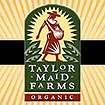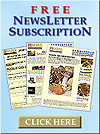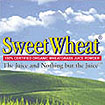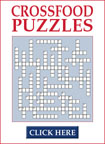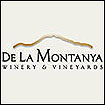Monterey Bay Aquarium -- Response to Seafood/Health
Reports
Aquarium
experts: Some wild-caught, farmed seafoods
are better choices for the environment.
People who choose to eat more seafood
because of its health benefits should
also consider the environmental impact
of the fishing and fish-farming practices
that put the seafood on their plate, officials
with the Seafood Watch program at the
Monterey Bay Aquarium cautioned.The reminder
comes following the Oct. 17 release of
two studies by the Institute of Medicine
of the National Academies and the Harvard
School of Public Health, which concluded
that there are health benefits for most
people from substituting seafood for other
animal protein in the diet.
“Seafood can be a healthy choice
for people, but it has to be a healthy
choice for the environment, too,"
said Jennifer Dianto, Senior Program Manager
for the aquarium's Seafood Watch program.
“Much of the seafood on the market
today is caught or farmed in ways that
are not sustainable over the long term.
The only way we can keep seafood in our
diet is by making choices that preserve
the abundance of wild fish populations
and protect the habitats that support
productive fishing grounds."
There are similar concerns about farmed
seafood from aquaculture operations. George
Leonard, the program's Science Manager
adds, “Farmed seafood is an increasingly
important source of protein worldwide."
“But many aquaculture operations
have yet to solve the problems that will
guarantee sustainable growth into the
future. That means assuring that fish-farming
doesn't destroy critical coastal habitats
needed by wild fish, generate unacceptable
levels of pollution in coastal waters,
or rely on catching wild fish to feed
aquaculture stocks beyond the point where
wild fish can keep up with the demand."
Since 1999, the aquarium's Seafood Watch
program has released consumer pocket guides
that help consumers choose seafood that
is caught or farmed in sustainable ways.
It has distributed more than 8 million
pocket guides nationwide, including five
regional guides, one national guide, and
two pocket guides in Spanish (a West Coast
regional guide and a national guide).
The aquarium also works with major seafood
buyers to shift their purchases to sustainable
seafood items.
“The choices we make as individual
consumers and as businesses drive the
seafood marketplace," Dianto said.
“Our purchasing power can make all
the a difference, by supporting fisheries
and fish farms that are better for the
environment, while at the same time relieving
pressure on others that are not doing
as well."
In just the last year, companies including
retailing giant Wal-Mart and Compass Group
North America, the largest food service
company in North America, have announced
plans to buy only seafood from sustainable
sources.
Leonard heads a team of fisheries researchers
at the aquarium who evaluate the most
popular seafood items on the market and
make consumer recommendations that each
item is either a “Best Choice,"
“Good Alternative" or a species
to “Avoid" based on whether
it is caught or farmed in a sustainable
manner.
The researchers evaluate each species
on criteria that include: the level of
bycatch observed (other fish and wildlife
caught and killed accidentally while fishing
for one species); other impacts from fishing
methods (including damage to habitat needed
by other ocean wildlife); and, for farmed
species, the farming methods, and how
well the fishery or aquaculture operation
is managed.
“With nearly 75 percent of the world's
fisheries either fully fished or overfished,
these are critical issues when people
make seafood buying decisions," Leonard
said. “By using our Seafood Watch
pocket guides, they can make choices based
on the best available information and
support environmentally friendly fisheries
and aquaculture operations."
“We believe that seafood from sources,
either fished or farmed, that can exist
over the long-term without compromising
species? survival or the health of the
surrounding ecosystem is sustainable,"
he said. “And when consumers choose
sustainable seafood, they can continue
to enjoy seafood as part of a healthy
diet."
More
information and printable pocket guides
are available at www.seafoodwatch.org.
The results of the Institute of Medicine
study on seafood and health can be found
at http://www.iom.edu/CMS/3788/23788/37679.aspx.
The
Harvard School of Public Health study
can be found at http://www.hsph.harvard.edu/press/releases/press10172006.html.
The
mission of the Monterey Bay Aquarium is
to inspire conservation of the ocean.
